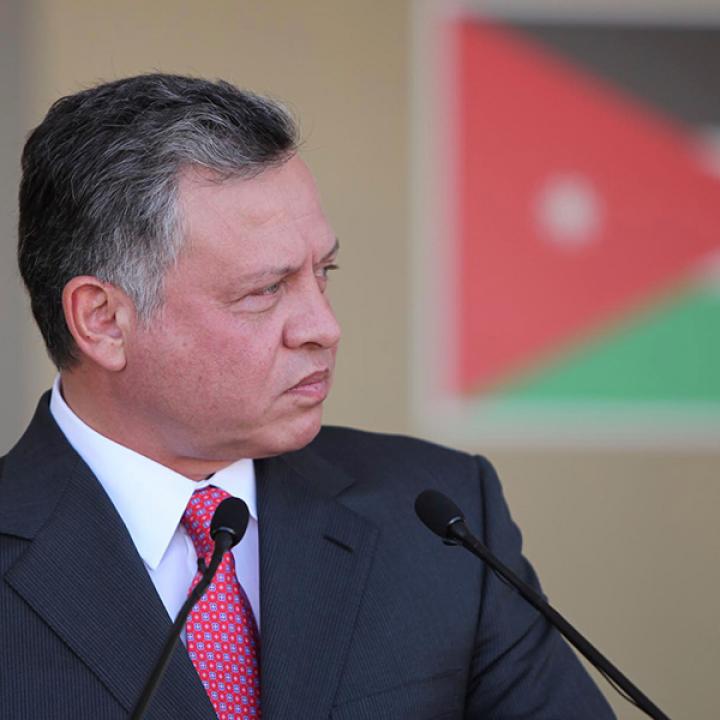
- Policy Analysis
- Fikra Forum
New Jordan Poll Reveals Surprisingly Moderate Public Opinion

September 20, 2017
As President Trump meets with foreign leaders at the UN General Assembly this week, new poll data demonstrates that his agenda -- combating jihadi terrorists, countering Iran, and broadening Arab-Israeli dialogue -- has great popular appeal in at least one key Arab country: Jordan. A reliable survey conducted in Jordan last month shows that many Jordanians now hold unexpectedly moderate views on all these topics, and more, including Islamic reform, relations with the United States, and even cooperation with Israel. In this one society, at least, these findings are so striking that they turn conventional wisdom about "the Arab street" on its head.
First, regarding jihadi terrorism, the fight against it ranks high on the list of Jordanian popular priorities for U.S. policy in the region, close behind efforts to resolve the Palestinian-Israeli conflict. Half the Jordanian public says the first or second priority should be for the United States to "expand its role in fighting against Daesh, al-Qaeda, and similar terrorist groups." Another U.S.-designated terrorist organization, the Shia Hezbollah movement, now has almost no popular support in Jordan: just 4 percent, a startling decline from a few years ago, when that group was viewed as actively confronting Israel.
In a similar vein, the percentage of Jordanians who favor a moderate reinterpretation of Islam, while a minority, has actually doubled over the past two years. Today, 39 percent say that "we should listen to those among us who are trying to interpret Islam in a more moderate, tolerant, and modern direction." By comparison, the hardline fundamentalist Muslim Brotherhood garners somewhat less approval. Only a quarter of Jordanians say they have even a "somewhat positive" view of that organization, almost exactly the same as in previous surveys.
On Arab-Israeli peacemaking, still more surprisingly, a remarkable 85 percent of Jordanians agree with this statement: "Arab states should play a new role in Palestinian-Israeli peace talks, offering both sides incentives to take more moderate positions." This is the essence of current American and Israeli proposals, and it enjoys unexpected resonance at the grassroots level in neighboring Jordan.
Equally noteworthy, fully one-third of the Jordanian public favors some forms of collaboration with Israel right now, before an Israeli-Palestinian peace agreement. Thirty-three percent say that "despite their differences, Arab states should work with Israel on other issues like technology, counterterrorism, and containing Iran." This marks a substantial increase from polls in 2014 and 2015, when Jordanians, like other Arab communities polled back then, overwhelmingly rejected the idea of any partnerships based on common interests (or common enemies) with Israel.
As against this newly moderate mindset, two caveats must be mentioned. First, a narrow majority of Jordanians (55 percent) voice a positive view of Hamas, which continues to reject peace with Israel -- although this is down somewhat from the 72 percent registered in September 2014, right after the previous Gaza war. Second, on a broader level, the Jordanian public today is more concerned about domestic problems than about Arab-Israeli or other external matters. Eighty-seven percent say that "right now, internal political and economic reform is more important for our country than any foreign policy issue." This includes nearly half of all Jordanians (43 percent) who feel "strongly" that way.
On Iran and its other regional proxies besides Hezbollah, the numbers are stunningly low. A mere 2 percent voice even a "somewhat positive" view of Iran. The Houthis, Iran's favored insurgents in Yemen, register still lower approval, at 1 percent. And two-thirds of Jordanians say that, in the current dispute between Qatar and other Arab states, "the most important thing is to find the maximum degree of Arab cooperation against Iran."
Finally, regarding the United States, Jordanians persist in their negative overall opinion of its Middle East policy; a mere 9 percent express a favorable view. But Russia rates even lower, at 1 percent approval. In sharp contrast, Turkey's regional policies garner 59 percent positive reviews.
This poll, however, asks a crucial follow-up question that others do not: regardless of favorability ratings, how important is it for Jordan to have good relations with each foreign country? Here the answers are much more positive for the United States: the majority of Jordan's public, 58 percent, think it important to have good bilateral relations. And only a very small minority, 9 percent, say that "the most useful thing the United States could do right now" would be to "reduce its interference in our region."
Altogether, then, this new survey provides hard data to support an unusual judgment: current U.S. Middle East policy initiatives could obtain considerable Arab support -- not just among their elites, but also on their street. In particular, the concept of a common regional front against jihadi terrorism and Iranian hegemonic ambitions, and in favor of Arab-Israeli peace, is on unexpectedly solid ground. And within that framework, even the notion of direct cooperation with Israel on issues of common concern, while still a minority view, is gaining unprecedented traction in Arab public opinion.
Methodological note: this survey comprised face-to face interviews with a representative, geographic probability sample of 1,000 Jordanian citizens. It was conducted in August by a local professional company, as part of a commercial market research survey. The statistical margin of error is approximately 2.9 percent, at a confidence interval of 95 percent.



